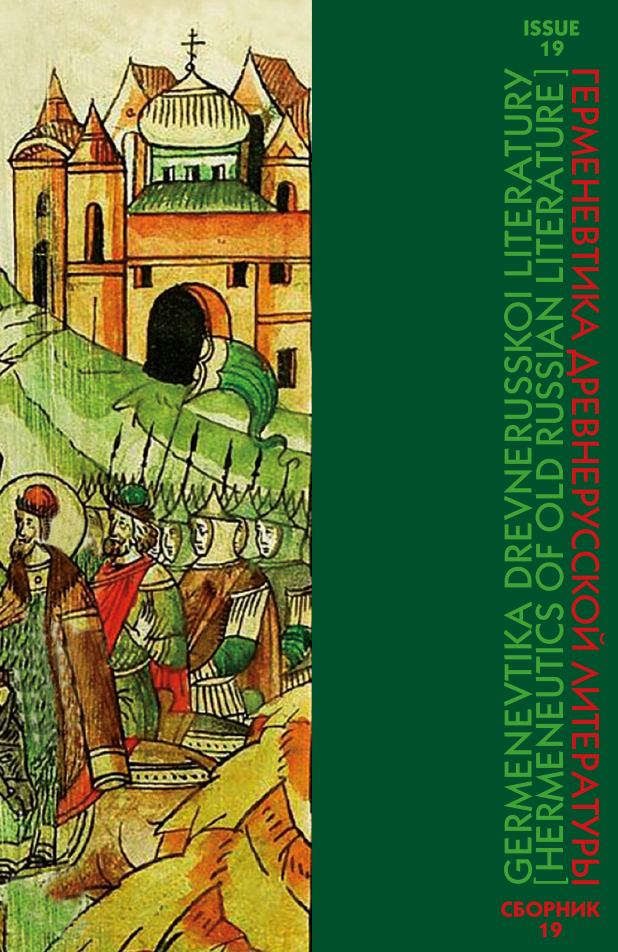Abstract:
In the Old Russian translation of the Greek novel on Alexander the Great, in the chronicles containing it, there is an account of the four rivers of Paradise, — Phison, Geon, Tigris and Euphrates. This one is a development of the biblical narrative, but does not go back to it directly. And the first difficulty is the question of its origin. The opinions of V.M. Istrin, O.V. Tworogov, E.M. Koroleva, and V.V. Mil’kov do not provide an answer to this question. However, the Anchor Word by Epiphanius of Cyprus contains a textually similar to the chronographic version discourse on the rivers flowing out of paradise (section 58). However, this monument is not known to the Slavo-Russian scribes. Therefore it is not clear how the story about the rivers of Eden got into the 2nd edition of the Alexandria Chronographica. It does not appear in the known Greek, Latin, Armenian, Ethiopian and other Eastern versions of the novel of Alexander. It is also missing in the 1st Slavonic edition and the Serbian Alexandria. It is possible that «Anchor Word» was translated into Slavonic, but the translation has not survived. Only extracts from this work have been preserved in the form of an article From the Ankurota in the Izbornik of 1073 and an unrelated with them the chronographic story On Rivers. The second difficulty is the interpretation and localization of the geographical realities contained in the story. And the most difficult in this regard is the river Fison, mythical, in contrast to all the others, which in ancient times was correlated with different regions. According to the chronographic account, the Fison flows through a number of Asian regions, Ethiopia and flows into the Atlantic Ocean. This is a fantastic notion that does not correspond to real geography, as does the fact that the rivers of Eden have a common source. However, people of the distant past believed in such a picture of the world, believing that under the Earth’s crust there is a single ocean feeding all rivers in general. In particular John Chrysostom wrote about it. It is interesting that such opinion is confirmed by modern scientific discovery concerning presence of water ocean under the Earth crust, a mantle. Thus, recognising and interpreting geographical, historical and mythological designations in Old Russian chronicles requires a complex research work, taking into account various fields of knowledge.
REFERENCES
1 Anokhin, G.I. Malyi Kavkaz [Lesser Caucasus]. Moscow, Fizkul’tura i sport Publ., 1981. 191 p. (In Russian)
2 Demin, A.S. “Indiia v drevnerusskoi literature” [“India in Old Russian Literature”]. Germenevtika drevnerusskoi literatury [Hermeneutics of Old Russian Literature]. Issue 21. Ed.-in-chief O.A. Tufanova. Moscow, IWL RAS Publ., 2022, pp. 197–215. https://doi.org/10.22455/HORL.1607-6192-2022-21-197-215 (In Russian)
3 Istoriia Drevnego Vostoka. Zarozhdenie drevneishikh klassovykh obshchestv i pervye ochagi rabovladel’cheskoi tsivilizatsii [History of the Ancient East. The Origins of the Most Ancient Class Societies and the First Centers of Slave-owning Civilization]. Dyakonova, I.M., ed., part 1: Mesopotamia. Moscow, Nauka Publ., 1983. 534 p. (In Russian)
4 Koroleva, E.M. “Rasskaz o brakhmanakh v drevnerusskoi i latinskoi versiiakh ‘Romana ob Aleksandre’: istochniki i ikh modifikatsiia” [“Story about the Brahmans in the Old Russian and Latin Versions of ‘Roman of Alexander’: Sources and Their Modification”]. Vestnik Pravoslavnogo Sviato-Tikhonovskogo gumanitarnogo universiteta. Seriia III: Filologiia, iss. 4 (30), 2012, pp. 41–58. (In Russian)
5 Mil’kov, V.V. “Inobytie i zhizn’ posle smerti po dannym drevnerusskoi knizhnosti” [“Other Existence and Life after Death According to Old Russian Literature”]. Voropaev, V.A. [et al.] Tanatologicheskaia tema v russkoi slovesnosti XI–XXI vv. [Thanatological Theme in Russian Literature of the 11th–21st Centuries]. Moscow, Indrik Publ., 2021, pp. 21–108. (In Russian)
6 Mil’kov, V.V. “Kontsept zemnogo raia v perevodnoi i original’noi knizhnosti Drevnei Rusi: spetsifika interpretatsii” [“Concept of Earthly Paradise in Translated and Original Books of Old Rus’: Specifics of Interpretation”]. Drevniaia Rus’: Voprosy medievistiki, no. 4, 2016, pp. 109–128. (In Russian)
7 Narody Afriki [Peoples of Africa], Ol’derogge, D.A., and I.I. Potekhin, eds. Moscow, AS USSR Publ., 1954. 732 p. (In Russian)
8 Rait, D.K. Geograficheskie predstavleniia v epokhu krestovykh pokhodov: Issled. srednevekovoi nauki i traditsii v Zap. Evrope [Geographical Ideas in the Era of Crusades: Research. Medieval Science and Tradition in the West Europe], ed. and pref. A.Ia. Gurevich. Moscow, Nauka Publ., 1988. 477, [1] p. (In Russian)
9 Rozov, A.V. Khristianskaia Nubiia: Ist.-krit. i tserk.-arkheol. Issled [Christian Nubia: Historical-Critical and Ecclesiastical and Archaeological Research], part 1. Kyiv, Tipografiia G.T. Korchak-Novitskogo Publ., 1890. [2], II, 728, 17 p. (In Russian)
10 Strekopytov, V. “‘Podzemnyi ocean’ v perekhodnoi zone mantii obrazovalsia bolee 3,3 mlrd let nazad” [“‘Podzemnyi okean’ v perekhodnoi zone mantii obrazovalsia bolee 3,3 mlrd let nazad”]. Elementy bol’shoi nauki [Elements of Big Science], 29.07.2019. Available at: https://elementy.ru/novosti_nauki/433502/Podzemnyy_ okean_v_perekhodnoy_zone_mantii_obrazovalsya_bolee_3_3_mlrd_let_nazad? ysclid=limt0fb5m1924972671 (Accessed 08 June 2023) (In Russian)
11 Shokhin, V.K. Drevniaia Indiia v kul’ture Rusi (XI — seredina XV v.): Istochnikovedcheskie problem [Ancient India in the Culture of Rus’ (11th — mid- 15th Centuries): Source Problems]. Moscow, Nauka Publ., 1988. 336 p. (In Russian)






